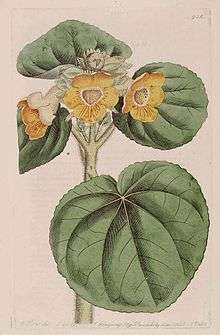Ibicella
| Ibicella | |
|---|---|
| | |
| dry seed pod | |
 | |
| Scientific classification | |
| Kingdom: | Plantae |
| (unranked): | Angiosperms |
| (unranked): | Eudicots |
| (unranked): | Asterids |
| Order: | Lamiales |
| Family: | Martyniaceae |
| Genus: | Ibicella |
| Species: | I. lutea |
| Binomial name | |
| Ibicella lutea (Lindl.) v. Eselt. | |
 | |
| Ibicella lutea distribution | |
Ibicella lutea (/aɪbᵻˈsɛlə ˈluːtiə/; syn. Martynia lutea, Proboscidea lutea) is a species of flowering plant known by the common names devil's claw, unicorn plant, martynia, proboscis flower, and ram's horn. It grows in dry conditions, such as those in desert regions. It is native to South America, but has become established as a non-native species in various semi-arid regions around the world, including Southern Africa and the Central Valley of California. The plant is aromatic, with an unpleasant scent. It produces short, glandular hairs over most of its aerial surfaces and is coated in sticky resin. Insects often become stuck in the slimy exudate and die, but the plant does not have digestive enzymes and does not absorb nutrients from the insects.[1] The plant can be considered protocarnivorous, but it is not carnivorous. The name "devil's claw" comes from the shape of the double-clawed seed pods. The sharp-toothed claws on the pods attach to large animals that brush against them, acting as the plant's method of dispersal.[2]
This plant is grown as an ornamental for its showy flowers and curious fruits.[3] The young fruits can be made into pickles and eaten.[3] Native Americans used the pods to create black dye for basketry and as a tool.[4]